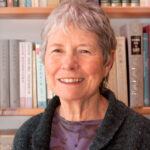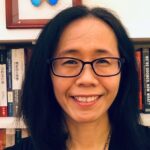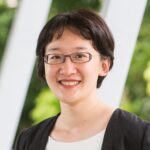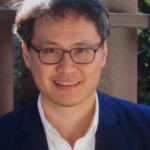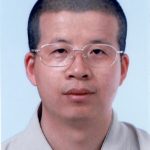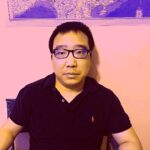Return to the main conference page.
| 1 | Sonja Arntzen (U Toronto)
|
Sonja Arntzen, MA (1970) and PhD (1979) University of British Columbia, taught at the University of Alberta and University of Toronto. Now living on Gabriola Island in BC, she continues her research in Japanese literature of the Heian and Medieval eras as well as experimenting with poetry writing. Her monographs include: Ikkyū and the Crazy Cloud Anthology (Tokyo University Press, 1986, revised and expanded edition, Quirin Press, 2022), The Kagerō Diary (University of Michigan, 1997), The Sarashina Diary: A Woman’s Life in Eleventh Century Japan, (Columbia University Press, 2014, Reader’s Edition, 2018) Current projects include a translation of the Ochikubo monogatari. |
| 2 | T. H. Barrett (SOAS) |
Tim H. Barrett is Emeritus Professor of East Asian History at the School of Oriental and African Studies, University of London. He studied Chinese at Cambridge and Buddhist Studies at Yale, and spent much of his career publishing on the history of the religious traditions of East Asia, primarily with regard to China. His books include Li Ao: Buddhist, Taoist, or Neo-Confucian? (1992), Taoism Under the T’ang (1996), The Woman Who Discovered Printing (2008), and From Religious Ideology to Political Expediency in Early Printing (2012). |
| 3 | Geoff Barstow (Oregon State) |
Geoff Barstow received his PhD in Tibetan Studies from the University of Virginia and is now an Associate Professor at Oregon State University. His research focuses on the history of vegetarianism on the Tibetan plateau, asking questions about how animals were viewed, how they were treated (ie: eaten), what that can tell us about Tibetan Buddhism, and how Buddhist ideas about animal ethics might impact broader philosophical discussions. As a teacher, his courses emphasize various aspects of Buddhist religious thought, but also seek to explore how those ideas have been lived and experienced by actual Buddhists. |
| 4 | James Benn (McMaster)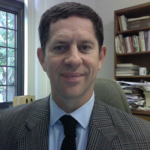 |
James Benn is a Professor in the Department of Religious Studies at McMaster University. His field of research is religion in medieval China (roughly fourth to tenth century, CE). To date, he has concentrated on three major areas of interest: bodily practice in Chinese Religions; the creation and transmission of new religious practices and doctrines; and the religious dimensions of commodity culture. In particular, he has focused on self-immolation, Chinese Buddhist apocrypha, and the history of tea. He works with primary sources written in literary Chinese and his research engages with that of scholars who publish in English and French as well as in modern Chinese and Japanese. Although his work is grounded in traditional Sinology—a discipline based on knowledge of the literature, history, and culture of pre-modern China—his publications are also aimed towards scholars of Religious Studies. |
| 5 | Kalzang Bhutia (University of Southern California )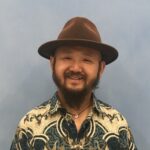 |
Dr. Kalzang Dorjee Bhutia (he/him/his) is a Visiting Scholar in the Asian Studies Program at the University of California Riverside and in the East Asian Studies Center at the University of Southern California. He is originally from west Sikkim, India, and completed his PhD in Buddhist Studies at the University of Delhi. He is currently completing a monograph on the environmental history of Sikkimese Buddhism. |
| 6 | Daniel Capper (University of Southern Missouri)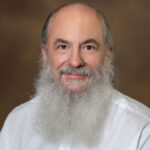 |
Daniel Capper, Ph.D., is a Professor in the School of Humanities at the University of Southern Mississippi, where he teaches Asian religions, comparative religions, and research methods. Trained in the field of science and religion dialogue at the University of Virginia and the University of Chicago, his interdisciplinary studies explore environmental ethical interactions with the nonhuman natural world comparatively as well as among American Buddhists. Capper’s many publications include the books Learning Love from a Tiger: Religious Experiences with Nature, Roaming Free like a Deer: Buddhism and the Natural World, and the forthcoming Buddhist Ecological Protection of Space: A Guide for Sustainable Travel Off-Earth. |
| 7 | Chia-ju Chang 張嘉如 (Brooklyn College – CUNY) | Chia-ju Chang is professor of Chinese in the Department of Modern Languages and Literatures at Brooklyn College, CUNY. Her background is in comparative literature. Her research primarily focuses on the emerging field of environmental humanities: Chinese and comparative ecocriticism, multispecies and critical animal studies, eco-cinema, and eco-Buddhism studies. As a Zen practitioner in the tradition of the Rinzai-Obaku sect in the US., she is interested in the intersection or dialog between Western ecocriticism and Chan/Zen Buddhism, and particularly in developing a praxis. She is the author of The Global Imagination of the Ecological Communities: Western and Chinese Ecocritical Praxis (Chinese; Jiangsu University Press, 2013). She has also edited the following four volumes: Chinese Environmental Humanities: Environing at the Margins (Lexington, 2019), Ecocriticism in Taiwan: Identity, Environment, and the Arts (Palgrave, 2016) and Heart of the Animals: Contemporary Critical Animal Studies Anthology (National Chung Hsing University, 2019). Her articles (in both English and Chinese) have appeared in many peer-reviewed journals, as well as numerous scholarly collections in the U.S., Taiwan, and China. |
| 8 | Melissa Curley (Ohio) |
Melissa Anne-Marie Curley is associate professor in the Department of the Comparative Studies at Ohio State University and the author of Pure Land, Real World: Modern Buddhism, Japanese Leftists, and the Utopian Imagination. With Melanie Coughlin and Jessica Main, she is preparing a translation of philosopher Keta Masako’s Philosophy of Religious Experience. Her current research focuses on the presence of the body in twentieth-century Japanese Buddhism. |
| 9 | Chris Goto-Jones (UVic)
|
Chris Goto-Jones is professor in Philosophy at the University of Victoria and Honorary Professor in Asian Studies at UBC. He lives on the unceded territories of the Lekwungen peoples, often called southern Vancouver Island, where he also serves as a therapist and Buddhist Eco-Chaplain. He has written on Asian and comparative philosophy, the philosophy of magic, performance and embodiment, and the therapeutic deployment of philosophy. His next book, ‘Mindfulness and the Search for the Meaning,’ is forthcoming in 2023 (Bloomsbury). |
| 10 | Ling Han (The Chinese University of Hong Kong)
|
Dr. Ling Han is currently an Assistant Professor in Gender Studies Programme at the Chinese University of Hong Kong. She is a sociologist researching the intersection of technology, social innovation, and gender. She obtained her PhD from the University of California, San Diego and was awarded a postdoctoral fellowship at Stanford University Center on Philanthropy and Civil Society. Her published works focus on gender and environmentalism, digital feminism, organizational innovation, and the meaning of work. She co-leads the global comparative project on the Civic Life of Cities Lab-Singapore with Stanford university and INSEAD Singapore. She has extensive collaboration experiences with foundations, nonprofit organizations, corporate philanthropies in China and Southeast Asia. She co-founded the Asia Academic Social Innovators Forum and led the new international research cluster on Gender and Digital Well-Being. Her most recent research examines the pursuit of the meaning of work among young social innovators in China. |
| 11 | Rey Sheng Her 何日生 (TCUST)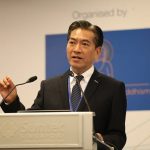 |
Dr. Rey-Sheng Her is currently Deputy Chief Executive Officer of Tzu Chi Foundation and an Associate of Harvard University, Faculty of Art and Science, CAMLab. He was also a visiting scholar at Harvard Kennedy School, Columbia University, Oxford University and Cambridge University, from 2018 to 2020, where he extended his researches on the philosophy of altruism and its application to organizational governance and economic life.
Dr. Her has devoted to the research on the fields of Buddhist philosophy, especially Contemporary Humanistic Buddhism, both on theoretical and empirical perspectives, and the Management and Operations of Faith-Based NGO. He received his Ph.D. in Philosophy from Peking University. Master of Art on Communication Management, the Annenberg School for Communication of the University of Southern California. In 2021, Dr. Her is the initiator of the “Yin Cheng Distinguished Lecture Series for Buddhism.” The lecture series aims to promote the research and practice of contemporary Buddhism. His recent book: “Economy of Goodness—The Altruism on the Economy Philosophies and Practices”, won three Awards in 2021, includes Golden Tripod Award, the highest honor in Taiwanese publication, the For Good Award, China, and the Shravasti Humanity Award, USA. |
| 12 | Kentaro Ide (Princeton) |
Kentaro Ide is a Ph.D. student of Department of Religion, Princeton University. He is working on his dissertation entitled “Hōnen and the Buddhist Soteriology of the Evildoer.” He is interested in the interaction of Buddhist doctrines and social history in Japan, and keeps asking the questions surrounding the relationship between observance or transgression of social-ethical norms in this world and requirements for liberation from this world. |
| 13 | Daryl Jamieson (Kyushu)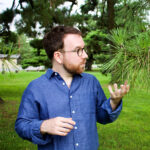 |
Daryl Jamieson (b.1980, Halifax NS) is based in Zushi and Fukuoka, Japan. After Wilfrid Laurier University, he studied at London’s Guildhall School of Music and Drama and the University of York. He then spent a post-doctoral year in Tokyo studying with Jo Kondo. He is currently assistant professor of composition at Kyushu University of Music and is published by Da Vinci Edition and the Canadian Music Centre. He has published numerous articles on contemporary experimental music and nō theatre through the lens of Japanese aesthetics and spirituality, and his translation of Jo Kondo’s homo audiens was released in May 2022 by MusikTexte.
In 2018, he received the Toshi Ichiyanagi Contemporary Prize for the third of his Vanitas trilogy of music theatre pieces. Jamieson’s music, written for both western classical and Japanese traditional instruments, is influenced by his study of Nō theatre and Japanese philosophy. It has been performed across Europe, Japan, and North America by many soloists and ensembles. In addition to composing, he also co-founded the intercultural music theatre company ‘atelier jaku’. |
| 14 | Songjoo Kim 金松柱 (University of Melbourne)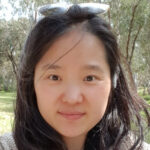 |
Dr. Songjoo Kim’s research focuses upon environmental aspects of Song dynasty literature, particularly engaging with Buddhist and Confucian intellectual thought concerning plant and animal life. Her representative articles include “Defending the Intelligence of Animals in Song Dynasty literature” (The Journal of Chinese Language, Literature and Translation – Korea) and “The Confucian Literati’s Adoption of the Buddhist Prohibition against the Killing of Animals in Song Dynasty China” (The Journal of Chinese Language and Literature – Korea). In 2020, Dr. Kim graduated from Korea University with a PhD in Classical Chinese Literature. Most recently, she has been teaching in the University of Melbourne’s Asia Institute as a sessional lecturer. |
| 15 | Chengpang Lee (The Hong Kong Polytechnic University)
|
Dr. Chengpang Lee is currently an Assistant Professor in the Applied Social Sciences at the Hong Kong Polytechnic University. Previously, he worked in the sociology department at the National University of Singapore. He obtained his Ph.D. from the University of Chicago in 2017 and was awarded a postdoctoral fellowship at Harvard Kennedy School to study the public policy in China. He publishes works in areas such as organizations, social movements, nonprofits, medicine and religion. His works on comparative politics and religious change in East Asia have been awarded several awards and appeared in journals, such as American Journal of Sociology, American Behavioral Scientist, Journal of Historical Sociology, China Information, Voluntas, Social Movement Studies, among others. Dr. Lee’s current book manuscript examines Tzu-Chi, one of Asia’s most influential religious and philanthropic organizations, and the transformation of the medical regime in Taiwan. |
| 16 | LIU Yi 劉屹 (Capital Normal University)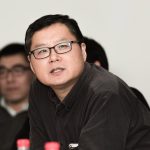 |
LIU Yi is professor and Dean of School of History at Capital Normal University and also the secretary of the Association of the Dunhuang and Turpan studies in China. His research interests include the Dunhuang studies and the medieval history of religion. For the past 20 years, he has been working on the history of Daoism and the Daoist scriptures. In terms of the former, he challenges the historical paradigm in which the sect of the Celestial Masters came directly down from the sect of the Five Pecks of Rice in the early Daoist history. In terms of the latter, he has specialized in the studies of such Daoist texts as Scripture on Great Peace, Xiang’er’s Commentary on Laozi, and Classic on Laozi’s Conversion of the Barbarians, and the Lingbao Scriptures of the Six Dynasties. He has recently shifted his research to the medieval Buddhist studies and is especially interested in the issue of the “Age of Dharma Decline.” He has published about 110 research articles, book reviews, and translated articles and 6 books and collected volumes. The latest books include Historical Research on the Daoist Guling Baojing in the Six Dynasties (2018) and Research on the History and Scriptures of the Daoism in the Han and Tang Dynasties: Selected Works of Liu Yi (2015). |
| 17 | Livia Monnet (University of Montreal) |
Livia Monnet is Professor of Comparative Literature, Film, and Asian Studies at the University of Montreal. Her research interests span environmental humanities, environmental film and media art, feminist and queer fiction and film, East Asian visual and popular culture (manga, anime, video games, ACG, K-Pop, K-drama), Indian, Chinese, and Tibetan Buddhist philosophies, contemporary Buddhism, film philosophy, decolonial feminisms, Asian and Indigenous futurisms, new materialisms, speculative fiction. Forthcoming publications include Toxic Immanence: Decolonizing Nuclear Legacies and Futures (McGill-Queens University Press, 2022; an article on the Chinese artist Lu Yang that will come out in Screen Bodies in July 2022; and an article on indigenous environmental art. |
| 18 | Brian Nichols (Mount Royal) |
Dr. Brian J. Nichols is an associate professor in the department of Humanities at Mount Royal University in Calgary. He holds a Ph.D. in religious studies with a concentration in Buddhism from Rice University. His forthcoming book Lotus Blossoms and Purple Clouds: Monastic Buddhism in Post-Mao China, published by University of Hawai’i Press, draws on ethnographic study and non-canonical sources to broaden the conception of Buddhist monasticism as a lived tradition. His interests include Buddhism in contemporary China, material and spatial studies of religion, and the emerging fields of ecodharma and contemplative studies. |
| 19 | Rolf Scheuermann (University of Heidelberg) |
Rolf Scheuermann is a research area coordinator at the Käte Hamburger Centre for Apocalyptic and Post-Apocalyptic Studies (CAPAS), Heidelberg University. He obtained a doctorate in Tibetan and Buddhist Studies from the University of Vienna and previously worked as a research coordinator at the International Consortium for Research in the Humanities “Fate, Freedom and Prognostication. Strategies for Coping with the Future in East Asia and Europe” as well as a substitute of the Junior Professor of Central Asian Studies at the University of Leipzig. Previous publications focussed on the early Tibetan bKa’ brgyud tradition, Tibetan strategies for coping with the future, the Jo nang tradition’s gZhan stong-Madhyamaka philosophy, the translation of Buddhist canonical works, and Tibetan eschatology. |
| 20 | Dagmar Schwerk (UBC)
|
Dr. Dagmar Schwerk is a German scholar focusing on Tibetan and Bhutanese Buddhism as well as Indo-Tibetan Buddhism. She specifically addresses the formation of doctrinal agendas covering subjects such as the Madhyamaka philosophy and the Mahāmudrā doctrine and meditative system. Moreover, as an expert in the field of Bhutanese religious and political history, she currently works on Bhutan’s identity- and nation-building processes between the eighteenth and twentieth centuries with a particular focus on Buddhist ethics and the environment. Following an M.A. in Tibetology, classical Indology, and political science, she graduated with a Ph.D. in Tibetology from the University of Hamburg in Germany in 2017 and is currently the Khyentse Foundation Postdoctoral Fellow in Tibetan Buddhist Studies at the University of British Columbia, Vancouver. She is also the recipient of the 2012 Khyentse Foundation Award for Excellence in Buddhist Studies at the Universität Hamburg. She is currently a Marie Skłodowska Curie Postdoctoral Fellow in the Institute for the Study of Religions at Leipzig University. |
| 21 | Sheng Kai 聖凱 (TsinghuaU)
|
Ven. Dr. Sheng Kai is a Professor in the Philosophy Department of Tsinghua University, the Executive director of the Buddhist Association of China, and a Graduate Teacher of Buddhist Academy of Putuo Mount, Zhejiang Province. In 2008, he was the Associate professor of Philosophy Department of Nanjing University.
He studied in the Buddhist Academy of China, Nanjing University, attained MPhil (Nanjing University) in 2002, PhD (Nanjing University) in 2005, and finished Postdoctoral study in Tsinghua University in 2007. He is the author of following books: (1.)The Buddhist Ritual of China, (2) Study on the Confessional Ritual of Chinese Buddhism, (3) The Buddhist Confessional Thought, (4) Study on the School of Mahayana-samuparigraha-sastra. He specializes in Buddhist Confession, Buddhist Pure Land Thought, Yogacara Buddism and Tathagatagarbha Buddhism. |
| 22 | Kurt Spellmeyer (Rutgers University)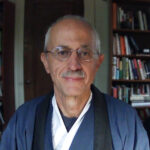 |
Kurt Spellmeyer is a professor of English at Rutgers University in New Brunswick, New Jersey, and a roshi (老師) in a lineage of Japanese Obaku (黄檗宗) Zen that begins with the arrival of Yinyuan Longqi in the Seventeenth Century. He is the author of Buddha at the Apocalypse: Awakening from a Culture of Destruction and a contributing editor at Tricycle: the Buddhist Quarterly. In his academic work, he has written on education, rhetoric, religion, critical theory, and the sociology of knowledge. For twenty-seven years he has also directed the Cold Mountain Sangha in central New Jersey. |
| 23 | Barend ter Haar (HamburgU) |
Barend ter Haar teaches Chinese studies at the University of Hamburg, with a strong focus on cultural and religious history. Although first of all a social and cultural historian, the religious dimension is so central to Chinese traditional life that much of his research up to now has dealt with religious phenomena. In addition, he has worked extensively on issues of ethnic identity, violence and fear, and social organization. An important concern of his is to demonstrate that traditional culture and cultural patterns are still relevant today, as becomes visible for instance in the case of the Falun Gong or the ongoing role of exorcist violence in political contexts throughout the twentieth century. Amongst other things, he published a book on a lay Buddhist group called the Non-Action Teachings (late 16th century to the present), which came out in 2014 with Hawai’i University Press as Practicing Scripture: A Lay Buddhist Movement in Late Imperial China. More recently he published Guan Yu: The Religious Afterlife of a Failed Hero in 2017 with Oxford University Press, and Religious Culture and Violence in Traditional China in 2019 with Cambridge University Press. He has just finished a monograph on Chinese fears and accusations of witches and witchcraft. |
| 24 | Hoai Khai TRAN (VinUniversity)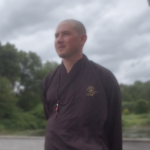 |
Quảng Huyền, secular name Hoai Khai Tran (Trần Khải Hoài), currently serves as Senior Lecturer of Vietnamese History and Culture at VinUniversity in Hanoi, Vietnam. He pursued undergraduate studies in Chinese Language and Literature at George Washington University and later completed his masters and doctoral degrees in Vietnamese Literature, Religion, and Culture at Cornell University. His research includes Sino-Vietnamese (Hán Nôm) studies, Vietnamese religion and Buddhism, and the academic study of martial arts. |
| 25 | Sharon Wesoky (Allegheny College)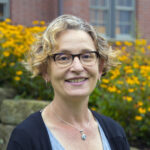 |
Sharon R. Wesoky is Arthur E. Braun Professor of Political Science at Allegheny College in Meadville, Pennsylvania. Along with numerous book chapters and articles, she is the author of Chinese Feminism Faces Globalization (Routledge, 2002), as well as the editor and chief translator of the works of Chinese feminist theorist Song Shaopeng, Chinese Modernity and Socialist Feminist Theory (Routledge, 2022). A longtime dharma student of Lodro Rinzler, she is also a member of the Upaya Zen Center Buddhist chaplaincy training program class of 2025. |
| 26 | Jeff Wilson (Waterloo) |
Jeff Wilson is Professor of Religious Studies and East Asian Studies at Renison University College, affiliated with the University of Waterloo. He is the author of Mourning the Unborn Dead: A Buddhist Ritual Comes to America (Oxford University Press 2009), Mindful America: The Mutual Transformation of Buddhist Meditation and American Culture (Oxford University Press 2014) and various other works, and co-editor (with Dr. Tomoe Moriya) of The Collected Works of D.T. Suzuki, Volume 3: Comparative Religion (University of California Press 2016). |
| 27 | Guo Wu 伍國 (Allegheny College)
|
Guo Wu is associate professor at Allegheny College, USA. He obtained his Ph.D. in Chinese history from the State University of New York in 2006 and has been teaching at Allegheny College, where he offers a wide range of courses in Chinese and East Asian history. He also serves as the chair of the college’s Chinese Studies program. His main research fields include Chinese intellectual history; Southwestern borderland studies, and the Chinese Communist movement. He has published three books, Zheng Guanying, Merchant Reformer of Late Qing China and his Influence on Economics, Politics, and Society(2010), Narrating Southern Chinese Minority Nationalities: Politics, Disciplines, and Public History (2019), and An Anthropological Inquiry into Confucianism: Ritual, Emotion, and Rational Principle (2022) and a number of peer-reviewed journal articles on the cultural politics and legal practice of the early PRC. |
| 28 | Teresa Zimmerman-Liu (California State University) |
Teresa Zimmerman-Liu teaches Asian Studies at California State University Long Beach. Her research focuses on religions in China and how they have adapted to the challenges of modernity and on the cross-cultural communication of religious norms and values in the increasingly globalized context of societies during the 20th and 21st centuries. Her work has been published in Review of Religion and Chinese Society and Journal of Church and State, among others. Her most recent research project examines how Taiwan’s humanistic Buddhists have inspired their followers to adopt environmentally sustainable lifestyles. |

